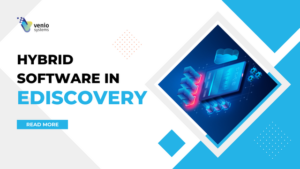[Editor’s Note: EDRM is proud to amplify our Trusted Partner’s education.]

Legal eDiscovery is becoming more and more competitive and data-driven. These days, legal firms are increasingly using reporting and analytics to discover key insights, lower production costs, reduce risk, and shorten early case assessments.
With this in mind, refining your eDiscovery reporting strategy is one of the most important thing you can do to enhance your operations and prepare for legal cases.
Read on to learn what eDiscovery reporting entails and why it’s important.
Reporting is necessary because legal teams must move quickly during eDiscovery to meet tight deadlines and respond to requests.
Team Venio
What Is eDiscovery Reporting?
eDiscovery reporting refers to the process of collecting, preparing, and reviewing electronically stored information (ESI) for use in a legal case. This is one of the most critical part of the legal eDiscovery process—especially considering that eDiscovery is all about managing information for use in court.
Reporting is necessary because legal teams must move quickly during eDiscovery to meet tight deadlines and respond to requests. Unfortunately, this is often difficult while dealing with large, complex datasets. Without proper reporting capabilities in place, legal teams can fall behind and miss important deadlines, leading to suboptimal legal outcomes.
Through the eDiscovery reporting process, legal teams can quickly discover, present key insights and determine which information is relevant for the case.
To illustrate, imagine a large lawsuit involving millions of electronic documents. During an early case assessment, the legal team would first need to compile bulk information and run searches to determine what data is relevant to the matter in hand. After searching and processing data, the legal team would better understand what they are working with. Finally they can figure out how to form a strategy.
In addition, data reporting also helps legal teams determine whether they are in a position to take on a client or case.
Benefits of eDiscovery Reporting
eDiscovery reporting may seem like a hassle at first, especially for the teams that want to move quickly. That being the case, it may be tempting to jump in and start digging through the data without going through the complete reporting process.
However, eDiscovery reporting is important for several reasons, which we’ll examine in this section.
Lower Risk
Thorough eDiscovery reporting reduces the chance of overlooking data and missing important insights. This, in turn, reduces risk. It also ensures that the legal team has a complete picture of the data they have at their disposal.
Reduce Costs
Data is very expensive to keep and process. And with this in mind, another great benefit of eDiscovery reporting is that it helps in keeping costs to a minimum. By reducing data volumes, you can lower the amount of information you need to process, export, store, and secure.

